702. John David Dyche, another Republican seeking to limit democracy
Last Tuesday, September 13, 2011, in a copyrighted story in the Courier-Journal, their McConnell apologist-cum-columnist John David Dyche warns of a "dreaded day" when people armed so heavily with voting rights will turn to violence in the streets, becoming clamorous, and look upon property as its "prey and plunder," once again demonstrating that when Republicans want your attention, it is mostly through the use of scare tactics and hyperbole that they will get it.
For a moment let's look beyond Mr. Dyche's idea that the property-less should also be the vote-less, meaning that those in nursing homes can't vote, those in college dorms can't vote, those older adults living with their children in "mother-in-law" apartments can't vote, those divorced or separated children who've returned home to Mom and Dad can't vote, those who live (and work) in long-haul semis and waterborne barges, moving America's products from sea to shining sea can't vote, and so many more he (and many Republicans) wish to eliminate from the voters rolls, let us look for a moment at the people he cited in his article as supporting such an idea.
As most Republicans do when wanting to harken back to the good ol' days, he first cites "The Founders." They use to call them the "Founding Fathers" but Dyche here engages in political correctness, something his ilk usually ridicules when used by others, leaving off the gender identifying noun "fathers."
Would that those in the halls of power today were as formidable a group as "The Founders," to use Mr. Dyche's PC-touched phrase. Thirty-three had served in the Revolutionary War. How many of today's politicians served in any war, or for that matter, in any branch of active service? Forty-two had attended the Continental Congress, and two had signed the Declaration of Independence; two would go on to serve as U.S. presidents, sixteen as governors, and two as chief justices of the United States. They were an unusual group of leaders who, on average, were in their early 40s. The notable exception was Ben Franklin. And, they were all male and all white. Their beliefs were governed by a world which was governed by white males. Naturally, some of their decisions were improper and we've corrected those over the years. Mr. Dyche, hoping to avoid being called racist or sexist (and he may not be), rightfully points out that limitations based on race and sex were wrong and have rightly been reformed. And at that point he begins his elimination of the franchise by saying that others - plural - other restrictions "made sense and merit reconsideration."
Since the only two restrictions he defines as being illegitimate are sex and race, one is left to believe that Mr. Dyche is approving of any and all other restrictions Americans have which would restrict their access to the ballot box.
He then goes on to outline one in particular, property ownership, which deserves reconsideration.
His first "witness" for his argument is British Commissary General Henry Ireton. Ireton married into the Cromwell family in England in the mid-17th century. One would think as Oliver Cromwell's son-in-law and heir to his political gains, that out of duty he would be supportive of Cromwell's policies. But, at discussions at the time, he supported retention of kings, nobles, and commoners - antithetical to Cromwell's plans. He called for a constitutional monarchy. (This may be why Dyche, a McConnell-ite, is drawn to him). But he was also antagonistic to the king, Charles, and eventually worked to overthrow him. Ireton was ruthless in battle, known to have executed those who stood in his way or supported the wishes of the king. He is known to have driven the Irish cities of Waterford and Limerick to famine and to have killed or killed himself several dignitaries of Limerick, including an alderman; Terence O'Brien, the Catholic Bishop of Limerick; and many others. Upon the restoration of the English monarchy, nine years after Ireton had died, his body was exhumed and summarily executed for his crimes against England. Such is the type of person Dyche would have us follow.
Mr. Dyche's next witness is a far cry from the rebellious Ireton. James Kent was and is a well respected jurist from New York who flourished in the late 18th and early 19th centuries, leaving his mark on a great deal of New York and American jurisprudence. He was the first law professor at what would become Columbia University and was a Chief Justice of the New York Supreme Court. Mr. Dyche quotes Kent as saying "The tendency of universal suffrage is to jeopardize the rights of property, and the principles of liberty." Mr. Dyche and his ilk love to use the word "liberty" when and wherever they can. Justice Kent made this statement in the 1777 New York State Constitutional Convention. It seemingly advises against widespread suffrage. Another statement made by Kent is one Mr. Dyche obviously chose not to use because it served the exact opposite purpose. Just as "The Founders" had some restrictions which were "rightly reformed" by later decisions, Justice Kent had by 1821 changed his mind on suffrage. In the 1821 New York State Constitutional Convention, Kent was again a member. And this time his statement, specifically speaking against a movement to take the vote away from African-American property owners, was as follows, "we did not come to this convention to disenfranchise any portion of the community, or to take away their rights." Other than the idea that it clearly did not serve his purpose, one must wonder why Mr. Dyche chose to ignore this statement of Justice Kent.
Mr. Dyche's next witness for disenfranchisement is Daniel Webster. Little research is needed to point out the flaw with the particular statement Dyche chose as representation for Webster's views. "Those who have not property . . . cannot be favorable to laws made for the protection of property." There is no argument with such a statement and if property were the sole purpose of our separation from England, then its inclusion in Mr. Dyche's essay would be understandable. But our Constitution's protections in the Fourteenth Amendment didn't stop with the word property. That sentence, which neither Mr. Dyche nor Sen. Webster seems concerned with states " [N]or shall any State deprive any person of life, liberty, or property, without due process of law . . ." Is Mr. Dyche concerned about life and liberty, in addition to property?
We know that Daniel Webster was, in fact, concerned with far more than property. One type of "property" at the time was slaves. Webster is known to have bought the freedom of (at least) three slaves, a woman named Monica McCarty, a man known only as Bean, and a man who worked in the White House and was once owned by Dolly Madison named Paul Jennings. However his good work is marred somewhat by his support of the Fugitive Slave Act, a part of the Compromise of 1850, generally attributed to Kentucky's Henry Clay. While it is unknown whether Monoca McCarty or Bean ever enjoyed the freedom to vote, Paul Jennings, as a resident of Washington DC until 1874 did, thanks in part to Daniel Webster.
The inimitable John Randolph is then quoted by Mr. Dyche for a few lines aimed mostly at those receiving government benefits of some kind. Randolph, a Virginian, does come close to the current mood and movement of those for whom the government is too big. He was a classic libertarian before such a thing existed. Mr. Dyche has expanded from a few sentences Randolph spoke against falling under the control of "King Numbers" into an ecstatic manifesto against anyone and anything on the public dole. But there is, to my knowledge, no clear connection between Randolph's sincere abhorrence of "King Numbers" and any desire on Randolph's part to limit participation in voting to the propertied class. Mr. Dyche here veers off of his original premise into the larger (and popular) argument of some present day anarchists - my friend Preston Bates comes to mind - who believe that government - any government - is a problem. King Numbers is the government itself, not the poor huddling masses called to be served by it. I believe Mr. Dyche has misappopriated the words of a man who probably is close to him in political philosophy. But the misappropriation is actually a broadside against the New Deal, the Great Society, and other programs created and passed to make better the lives of as many Americans as possible. These are commitments America owes to its citizens.
Big government is the object against which Mr. Dyche is truly writing. It is no secret that he and his Party favor a smaller government, with fewer laws, fewer restrictions, and fewer taxes. But, over the years our government has expanded, by the will of the people through the votes of the Congress. Part of that will, that of providing what Republicans and Libertarians like to call "entitlements" but what others like to call "commitments made and expected to be kept," has gotten our Republic into a sea of Red Ink over the years. The ink never dries as the Congress, which has the sole power to tax the citizens to pay for the programs it has approved, has failed in its mission of keeping up with its own priorities. We allegedly "misguided liberals" aren't blind to the current fiscal crises. We, in fact, believe that it was largely created by Republicans who insisted on paying for two wars over the last eight years, who enacted a series of tax cuts to the wealthy, and who in general are themselves blind to the current fiscal problems - read commitments - and ideologically opposed to correcting it.
And while Tea Partiers and others lament America's "high taxes" they ignore the reality that taxes are lower today than they have been for many years. And the Congress, whether led by Democrats or Republicans, is unwilling to cough up - in the form of higher taxes - the obligations to which it has bound itself over the years. The piper has come to collect his pay and few are willing to admit that we actually owe the bill.
Rather than face the reality of a bankrupt system, irrespective of who or what bankrupted it, Mr. Dyche suggests for the future a limited democracy of property owners only as the panacea for America's problems, including what he sees as its moral decline. He doesn't fully explain the connection but the implication is that those who own no property are guilty of the moral decline of America. I would argue, as did the Bible, that the love of money - filthy lucre - is the root of all evil. And as America is a country based on capitalism as opposed to some other form of government, we are pre-disposed to a corrupt culture, something Ben Franklin and John Randolph warned against - the root of all evil which is the love of money.
The dread day draws nigh when only the propertied, only those with money, control who we are, where we go, what we eat, how we work, what we read, who we date, and what we believe. This is a far cry from the concepts of communal harmony set forth in our Constitution, written and approved by those "Founders" Mr. Dyche cited at the beginning of his esssay.
"We the People of the United States, in Order to form a more perfect Union, establish Justice, insure domestic Tranquility, provide for the common defense, promote the general Welfare, and secure the Blessings of Liberty to ourselves and our posteritym do ordain and establish this Constitution for the United States of America." One must be struck by all those collective, non-restictive words in this single-sentence preamble to America's bible.
How are the words "we," "Union," "common," "general," and "ourselves and our posterity" protected if only those select few property owners are allowed to govern us? To reverse the words of the jurist Kent, "would not the tendency of such an electorate jeopardize the rights of the non-propertied?" Using the logic Mr. Dyche has appplied, yes, they would. He would have all those without property governed solely by those with property. How does this promote the general Welfare of the citizens of our Republic?
Mr. Dyche didn't address that concern because for him and those of his ilk, it is not a concern at all.
And while I am not looking forward to it, I am waiting for Mr. Dyche's follow-up on the "other" restrictions he believes merit reconsideration. In the last sentence of his third paragraph is to be found the plural noun "others." Tell us, Mr. Dyche, how next you would restrict access to the ballot?


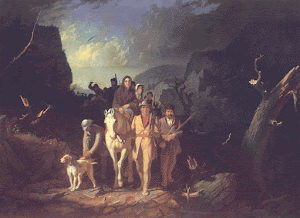












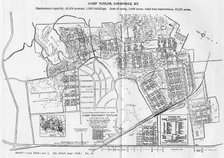
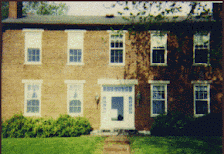

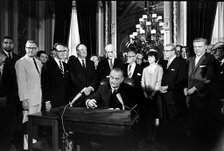

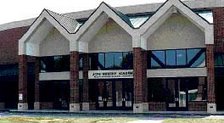


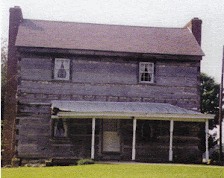
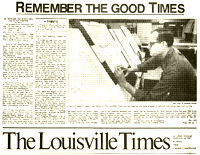
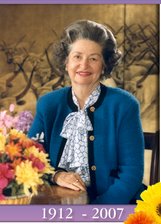
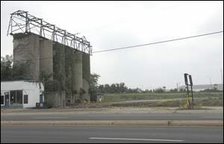
No comments:
Post a Comment